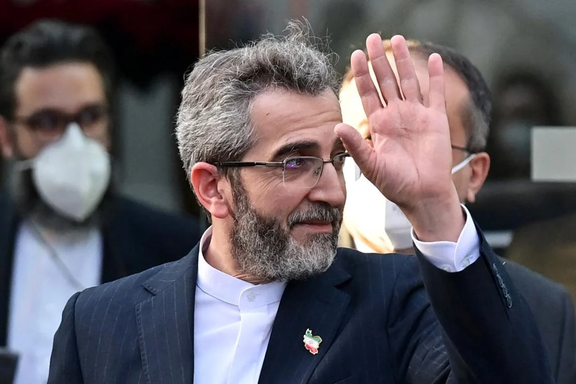Iran Nuclear Talks Resume As Both Sides Seek Leverage

Iran's negotiator in Vienna nuclear talks has hailed China’s support for “removal of illegal US sanctions" and guarantees it would not again quit the agreement.
As talks in Austria to revive Iran’s 2015 nuclear deal resumed Thursday, Ali Bagheri Kani’s comments were reported by Fars News after his phone call with Ma Zhaoxu, China’s vice-foreign minister.
Zhao Lijian, a Chinese foreign ministry spokesman, said Tuesday that all parties should commit to serious negotiation to revive as soon as possible the 2015 deal, the JCPOA (Joint Comprehensive Plan of Action).
Zhao said that as the party responsible for the crisis, the United States should lift ‘maximum pressure’ sanctions imposed on Iran after the US left the JCPOA in 2018, while Tehran should restrict its nuclear program, ramped up since 2019, to JCPOA limits.
An "informed source" Wednesday told Fars that Iran found China and Russia in agreement with Iran on the main points of proposals Tehran presented in Vienna last week. In a television interview Sunday, President Ebrahim Raisi (Raeesi) said Iran would return its atomic activities to JCPOA limits if Washington lifted the sanctions.
Bagheri Kani met with Sergei Ryabkov, Russian deputy foreign minister, in Moscow Tuesday. Russian President Vladimir Putin told a press conference Wednesday, after a video talk with US President Joe Biden, that Moscow would brief Iran on discussions with Washington, which takes part in the Vienna talks indirectly.
"We'll continue discussing this subject during the possible visit by the Iranian president to Russia early next year," Putin said.
Bagheri Kani arrived in Vienna Thursday for the second round of talks since Raisi became president in August, with immediate meetings scheduled with Russian and Chinese representatives and with Enrique Mora, the European Union official chairing the talks, which formally involve remaining JCPOA signatories China, France, Germany, Iran, Russia and the United Kingdom.
Short runway
After a phone call Wednesday with Hossein Amir-Abdollahian, Iran’s foreign minister, the EU foreign policy chief Josep Borrell tweeted: “We need to advance much quicker in the negotiations to restore the deal.” Borrell wrote the call had been arranged at Amir-Abdollahian’s request.
In an article for the Russian daily Kommersant Tuesday,Amir-Abdollahian wrote that the ‘E3,’ who criticized the US for leaving the JCPOA but did little to counteract ‘maximum pressure,’ saw the US stance as unacceptable but were nonetheless following it.
The US State Department Spokesman Ned Price defended the US approach Wednesday by saying Russia and China should aim to “verifiably and permanently prevent Iran from ever obtaining a nuclear weapon." Price said the “runway is getting very, very short for negotiation” and that if Iran was not in Vienna “in a substantive, a genuine, a constructive way" then the US would raise the “topic of discussion with [Israeli] Defense Minister [Benny] Gantz.” Israel has reportedly allocated $1.5 billion for an attack on Iran.
The US has been tightening sanctions. It sanctioned Tuesday nine Iranians – along with five Syrians and a Ugandan – as a prelude to a US ‘Summit for Democracy.’ The US announced Thursday it was next week sending a delegation, including the head of the Treasury’s Office of Foreign Assets Control, to the United Arab Emirates.
The UAE is trying to reduce tensions with Iran, sending a senior official to Tehran for talks Monday. Iran was the Emirates’ fifth largest trade partner in the first nine months of 2021. ‘Maximum pressure’ sanctions empower the US administration to penalize any entity dealing with the Iranian financial sector.